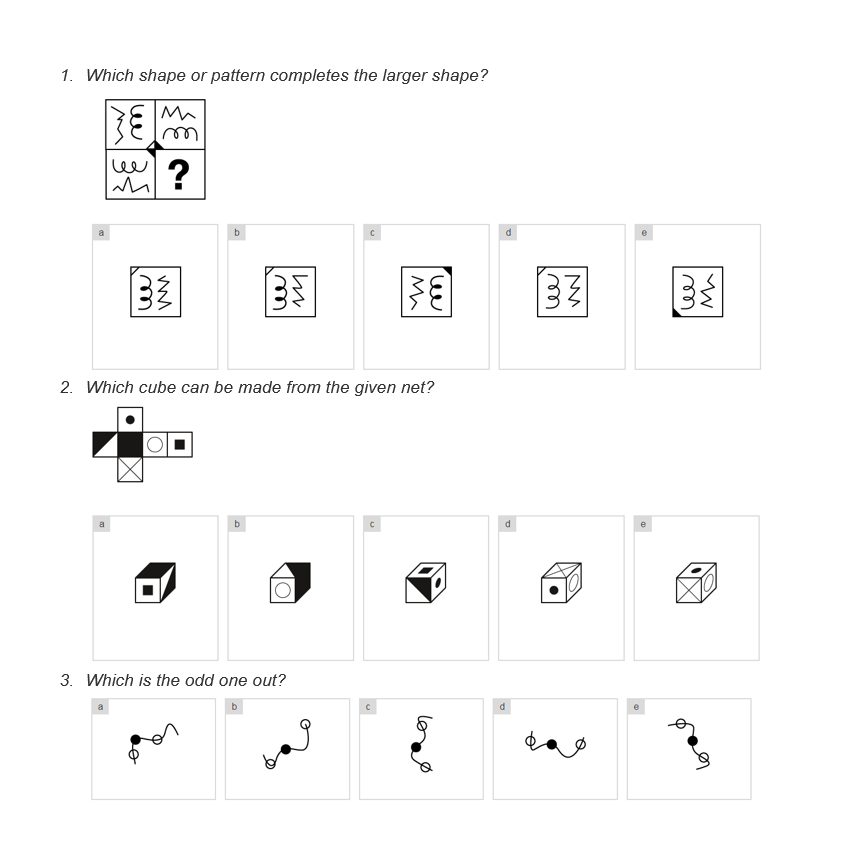Non-verbal reasoning is one of those phrases you may have heard a lot, especially if your child is in Year 6, and it is likely to come up in many Year 6 home/school meetings. But what exactly is non-verbal reasoning?
What exactly is non-verbal reasoning?
Non-verbal reasoning is sometimes called abstract reasoning. It involves solving problems usually presented in diagram or picture form. This means that visual clues are more important than words — hence the term non-verbal. The reasoning bit simply means ‘finding the correct answer’.
With the possible rise in grammar schools, the non-verbal reasoning test has had a high profile in the news recently. The 11+ exam taken by some Year 6 children may well use non-verbal reasoning testing, as will the entrance exams of some independent and public schools.
Why test non-verbal reasoning?
Non-verbal reasoning is tested because it shows a variety of skills that are not limited by words and language. These tests can be especially useful for children who find it difficult to talk or communicate verbally, children with English as a second language, and children who are dyslexic. It is also believed that they show a child’s general intelligence and ability without being dependent on maths or English skills.
Tests are used to show how children can learn new ideas and how quickly they can focus to find similarities or differences in the information given. Quick decision-making is important as there may be a time limit. Non-verbal reasoning skills are especially useful for science subjects, maths, engineering, computing, and design. In fact, non-verbal reasoning tests are not limited to school tests; many job interviews also include them.
What will non-verbal reasoning tests involve?
Tests are often made up of a series of multiple-choice questions. Children will be asked to spot the odd one out, the next in the series, or the correct answer in a group of 4 or 5 shapes, pictures, or diagrams. Questions may get harder as the test goes on.
Some examples of non-verbal reasoning questions
(Have a go! Answers are at the bottom of the article)
Source | https://www.bond11plus.co.uk
How can parents help at home?
Non-verbal reasoning tests are all about spotting relationships and patterns between objects; using logic and deduction; and approaching questions methodically. Here are some ways you might help hone your child’s skills in these areas:
- Practice makes perfect! The more of these types of questions your child does, the better they will get. There are lots of good non-verbal reasoning books available in bookshops. Going through questions in a book like this is a good way to familiarise your child with the different types of questions they may see. There are also lots of free online tests you can be print and try out at home (some suggested links below).
- Playing games can help! Making or completing jigsaws, model-making, Sudoku, or logic problem books are all forms of non-verbal reasoning questions that feel more of a treat than a test. Strategic games like chess or draughts are also brilliant for decision-making and thinking ahead.
- To help with test-technique, encourage your child to get stuck in with pencil and paper if they’re stuck: copying the diagrams can sometimes help children spot differences/connections. Tracing paper is especially useful for this and particularly helps with the rotational type questions that can crop up. Making notes is also a good idea to keep track of numbers in patterns.
- Encourage attention to detail. I used to play a game in the car called ‘the first person to spot…’ It involved me thinking of things for the children to look for, such as a man wearing a hat or a ginger cat or a red flower. It kept them occupied while also encouraging specific observation skills from a very young age. This can also be used in non-verbal reasoning questions. If your child is unsure of an answer, suggesting they focus on various aspects of the pictures (for example, colours, directions, sizes, angles, or lines) might help them notice a previously unnoticed pattern or connection.
And finally, relax! This is an area where anxieties can run high — the question format is probably new, and your child may feel pressure to do well because of what a pass might mean. Encouraging a playful, positive approach will undoubtedly help them on their way to stress-free success!
Good websites to try

Non-verbal reasoning workbooks
Non-verbal Reasoning 10 Minute Tests: 10-11+ years
Bond 11+
This book provide essential bite-size practice in non-verbal reasoning skills, setting strong foundations for success in Common Entrance or 11+ exams.
Non Verbal Reasoning Assessment Papers Book 1: Age 9–10
Bond 11+
Topic-based non-verbal reasoning practice questions that set the foundation for success in 11+, Common Entrance or KS2 SATs exams. This new edition contains clear and full answer explanations in a pull-out answer section. Ideal for parents and children to work through without extra research.
Non Verbal Reasoning Assessment Papers Book 1: Age 10–11
Bond 11+
This book develops non-verbal reasoning problem-solving skills, encouraging thinking skills and providing preparation for Common Entrance and 11+ exams.




